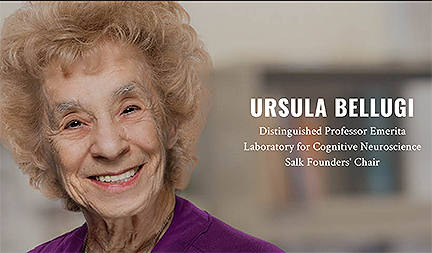 After nearly forty-eight years at the Salk Institute for Biological Studies, Dr. Ursula Bellugi has retired. The closing of the Laboratory for Cognitive Neuroscience last month has signaled the end of an era.
After nearly forty-eight years at the Salk Institute for Biological Studies, Dr. Ursula Bellugi has retired. The closing of the Laboratory for Cognitive Neuroscience last month has signaled the end of an era.
Dr. Bellugi’s contributions to the research community were vast and her research on Williams syndrome has changed the future for our sons and daughters. The WSA will greatly miss partnering with Dr. Bellugi to solve the mysteries of Williams syndrome.
Thirty-five years ago, Williams syndrome was often characterized as the “cocktail party syndrome” – researchers seemed to feel that the most notable aspect of our children was that they were shallow – great at conversation openers like “Hi, how are you”! “I love your dress,” or “you look beautiful tonight”! but with little ability for more meaningful communication. The balance of those early reports on Williams syndrome described “mental retardation” and many other limitations, with little or no mention of strengths; and gave parents of newly diagnosed children very little hope.
It wasn’t until we met Dr. Bellugi in the 1980s that the future began to brighten for those affected by Williams syndrome. “Dr. B” pioneered the study of the biological foundation of language. In fact, she is regarded as the founder of the neurobiology of American Sign Language. Her work was the first to show sign language as a true language as processed by the brain. Through her studies at the Laboratory for Cognitive Neuroscience at the Salk Institute, she revealed a great deal about how the brain learns, interprets and forgets language. She was known to have an unquenchable thirst for knowledge – constantly seeking new avenues for illuminating the ties between neural and cognitive functions.
That endless curiosity is what first led Dr. Bellugi to Williams syndrome. She accepted the request of a parent to meet her child with Williams syndrome who had an unusual language profile. That meeting was the beginning of new research explorations for Dr. Bellugi. Her research began to enlighten us to the unique language strengths of those with WS, and it brought together experts in diverse fields to study the complex issues related to Williams syndrome.
Part of Dr. Bellugi’s wonderful gift to the Williams syndrome community was that she brought families and scientists together. When Ursula first arrived at the Salk Institute in 1970, she was the only researcher there who studied people rather than the contents of a test tube or a petri dish. That alone was groundbreaking, but she pushed the limit even further when she began studying Williams syndrome in the early 80’s and invited several other scientists to join her studies, which were aimed at linking the brain, cognition and genetics. She then insisted that those other scientists get to know Williams syndrome “up close and personal,” inviting colleagues to attend family gatherings she would regularly host at the Salk. As a result, these scientists who were looking at brain neurons, or a slice of brain tissue, or stem cells of children with Williams syndrome, began to take a new interest in Williams syndrome and look at their slides with a much more personal view.
Dr. Bellugi has published more than 250 papers and was inducted as a member of the highly prestigious National Academy of Sciences in 2008. But more importantly to us, she has met and included nearly 1100 individuals with Williams syndrome in her research to uncover clues about the social brain. In the process, she has become so much more than just a scientist to us. As one of her colleagues put it, she is both a pioneer and an inspiration. Dr. Bellugi is a beloved member of the WSA community, and we were thrilled to honor her in 2017 with our Lifetime Achievement Award. From her early papers describing the unique language strengths in WS to lessons she has provided about the links between gene and cognition, and most recently the knowledge that people with Williams syndrome have boosted levels of oxytocin, the so-called “trust hormone”, Dr. Bellugi has truly made a difference for everyone in the Williams syndrome community.
Dr. Ursula Bellugi is revered as a scientist and truly loved by WSA families. She has left a legacy that will long be remembered. Enjoy your retirement “Dr. B.” We will miss you greatly!
--Terry Monkaba, Executive Director, WSA
Videos created for the WSA by Jon Kent, Kent Creative.
